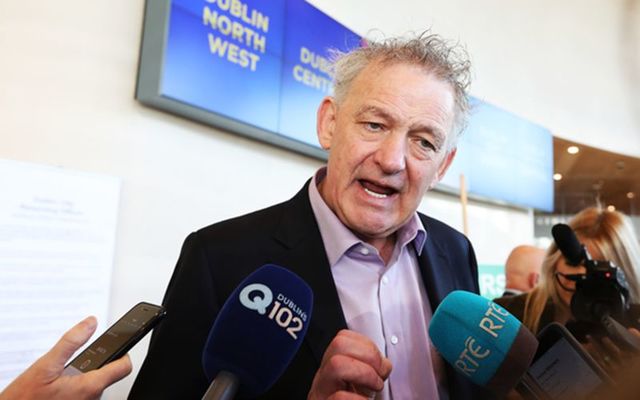The recent presidential election in Ireland saw the expected victory of incumbent Michael D. Higgins, who emerged victorious on the first count after winning 52.4% of first preference votes.
Despite Higgins' relative landslide, the big news was the 23% gained by right-wing populist Peter Casey. He had been running at 2% in a recent poll.
Casey is a millionaire Derry-born Irish businessman recently returned from the US to live in Ireland. Suddenly he has become the most discussed figure in Irish politics.
Ireland has heretofore been considered an outlier in the present age of right-wing populism in Europe. While right-wing parties sweep Europe, shake the political establishments in Germany, and even overtake some governments in Eastern Europe, even the presence of a prominent populist party has been totally absent.
Read more: Three reality-TV businessmen are looking to be Irish President - sound familiar?
A big thank you to the 342,727 people who came out to vote for me. Your voice has been heard and this conversation has only started #Aras18 pic.twitter.com/flugSTlMmF
— Peter Casey (@CaseyPeterJ) October 27, 2018
Peter Casey's performance challenges this narrative, demonstrating that though unrepresented politically, there does exist some feelings of deep resentment in Ireland which very closely resembles those strains sweeping Europe. Of course, there does exist now a political party devoted completely to 'Irexit,' but it is yet unclear how the feelings of resentment Casey uncovered will translate in later elections.
For most of the campaign, he ran quietly under the radar, but an eleventh-hour derogatory comment about the traveling community won him both widespread criticism and, ultimately, praise. Supporters lauded his willingness to "say what's on everyone's mind" and his status as an outsider who was willing to shake up the system. Both Casey's stances, as well as the attitudes of his political supporters, earned him comparisons to Donald Trump, and the comparisons are not unfounded.
Casey finished in a surprise second place. While Casey's achievement should not be overexaggerated, it did seem to reveal a vibrant strain of populist sentiment in Ireland.
Read more: Racist Irish Traveller comments have heated up dull Irish presidential campaign
Peter Casey says he’s still waiting on an apology from the Taoiseach and that Leo Varadkar is out of touch with people #Áras18 pic.twitter.com/bgPJlmH0qU
— Sean Defoe (@SeanDefoe) October 27, 2018
Casey consistently railed against the political and economic elite, demanding that Irish society is re-ordered to benefit working people as opposed to elite bankers.
As for Casey himself, he has indicated that his political career has just started. Following the election, Casey expressed interest in running for a Dáil seat, possibly in Donegal.
Significantly, he indicated that he would join Fianna Fáil and immediately indicated that his ultimate objective was to win the party leadership and serve as Taoiseach. Although this serves as a slight shock, Casey faces a major uphill battle to his political aspirations, but his path to power might be easier than appears at first glance.
Fianna Fáil stands a crossroads in its history. For most of its history, it was considered the more radical, slightly left-wing party. Its traditional base was in the western and southern parts of the country, and it was always considered the more republican party, due to historical factors.
After nearly a century of dominance, Fianna Fáil was largely blamed for the financial collapse in 2008. It was decimated at the polls and has still not yet recovered from that disastrous defeat.
Peter Casey is having a gander at the results... #Aras18 pic.twitter.com/ZtGnKyzSMi
— Nicky Ryan (@NickyRyan_) October 27, 2018
Compounding its failure to restore its image, its profile as the left-leaning, more radical party has been challenged by a resurgent Sinn Féin, which capitalized on Fianna Fáil's performance in 2011 and has replaced Labour as the third largest party in Ireland.
Indeed, Sinn Féin has taken aim at Fianna Fáil since the 2016 election, as opinion polls indicate that a generational shift could see Sinn Féin leapfrog Fianna Fáil within the next generation.
Fianna Fáil is thus in the throes of an identity crisis. It has been unable to restore its image as a party of the people, its official stance during the abortion referendum made it appear out of touch to voters, and it has been unable to impede Sinn Féin's meteoric rise. Indeed, some pundits opined that if Mícheál Martin was unable to oust Fine Gael in the next general election, it could intensify internal calls for a leadership change.
Fianna Fáil supporters voted overwhelmingly in favor of Casey, indicating his popularity among the Fianna Fáil base. While it is way too early to predict how Casey might perform in a general election, if he can capitalize on the surprising wave of support he received during the presidential election, the Fianna Fáil base might see him as the answer to their recent woes. Casey obviously carries clout among Fianna Fáil voters, and if officials feel that they can temper his more hardline views, they might be willing to thrust him forward as their new face in order to restore their traditional position.
Whatever the fate of Casey's political career, it is now clear that a new strain of right-wing populism exists in Ireland. Following the formation of the Irexit Freedom Party in September, Casey's presidential performance uncovers a distinct strain of resentment and frustration which has heretofore been assumed to be nonexistent in Ireland.
This article was submitted to the IrishCentral contributors network by a member of the global Irish community. To become an IrishCentral contributor click here.




Comments